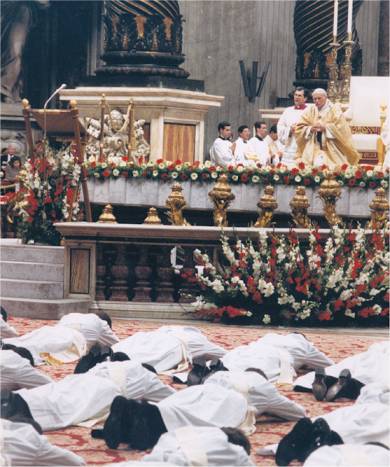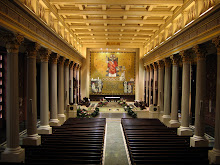A main theme for Lent continues to be our ongoing need for conversion, an ongoing need to recognize the supremacy and authority of Christ in our lives, and the continued tension to give over more of our life to Him, so that he can lead us closer to our Heavenly Home. Certainly, this is not always easy, and very rarely is it ‘fun,’ yet it is profoundly necessary to continue to recognize our great need for Christ to be in our life, to leave behind our sins, and then to spread that message of salvation to those we come into contact with.
In a very descriptive way, this is exactly what we have heard in our Gospel lection for today: first, a recognition of our sinfulness; secondly, a healing encounter with Christ; and finally spreading the Good News of our salvation with all we meet. Our relationship with Christ should make a difference in our lives, a difference that others should be able to see, and come to a similar relationship through our witness to them.
First, the recognition of our own sinfulness. There has been a temptation over the last years to move to a ‘Joel Olsteen’ method of Christianity; the ‘I’m ok, you’re ok’ branch that, unfortunately, does not leave much room for conversion. I do not see this as an authentic interpretation of the Scriptures that the Church presents for us, especially during this great season of Lent.
Going back to the story we have presented to us today. The woman is certainly aware that she is a sinner, for she is an outcast from society, shunned by her own village, for the simple fact that she does not come to draw water with the rest of the village, something that was always a communal event. By the fact that she comes out about noon, a hot and miserable time of day in the Holy Land, and not early in the morning, shows that she is an outcast. The reason for this casting out from the village is that she would be publicly known as a sinner, which we come to find out later is because of her somewhat loose nature of a few too many husbands. (She’s now on her sixth!)
What always strikes me is that Jesus already knows the condition of her heart. He knows why she comes out at such an odd time of day, he is able to read her heart and recognize that she does desire to be healed. And this is the opening. This is the first step in our journey as Christians, in our continuing conversion that began with our Baptism and will continue to the day we die: a constant awareness that we can be healed on our own, but that we need to turn to Christ and ask for that healing, out loud, by pleading for his healing.
Step two: that healing encounter. The Church does not advocate that we wallow in sinfulness, but has given us a wonderful repository of grace to alleviate our suffering and free us from our continued slavery to the power of the Evil One: the Sacrament of Confession, in which we confess our sins and weaknesses to the priest, as if to Christ himself. This is one of the many opportunities we have within the Church to respond to Jesus’ invitation to leave behind our sinful ways and ‘go and sin no more.’ In this wondrous Sacrament, we are able to lay our weaknesses, our faults and failings at the feet of Jesus, and experience his well of great mercy so that we can be healed of what separates us not only from Christ, but also one another.
In this encounter with Christ, through the priest, we come to a greater and deeper awareness that Jesus is the Messiah, the one sent by God to teach, to heal, and to reconcile. Jesus was not just a great teacher and friend, he is Savior. He has a specific mission to return us, not just to a place in an earthly Garden of Eden, but to a spot at the Father’s Heavenly Altar. Even as profound and massive as this altar here is, it is only a small and somewhat insignificant replication of that Altar in heaven. And we can only get there through Christ.
Granted, it is not always fun to come before a priest and admit our weaknesses, for he is just as much of a sinner as the penitent. Yet, if we ignore our sins, if we ignore our need for redemption, freedom; the pain and injury that result will just increase, will fester until it causes severe damage to our soul. I liken Confession, at times, to the pulling of a splinter from your finger. The pain can be severe, it can be uncomfortable, yet the peace that comes afterwards, the relief that comes afterwards, is much worth the momentary discomfort. Plus, if we do not deal with it, it grows, and can affect the whole of the body, not just the one finger that was originally infected.
Step Three, spreading the message: Once we have had this encounter with our Savior, with Christ, we follow the model of this woman at the well. She is not content to just sit at his feet, rather she goes and tells her fellow villagers, even the ones who have shunned her, who is in their midst. Now that she has been healed, she must bring others to the Healer.
This is the dimension that is often, sadly, missing among Catholics. I hear from Protestants who are thinking of conversion, yet they are less than inspired by the lackadaisical attitude of so many Catholics. Do you realize that here, at this very Mass, we are able to receive within the very Lord of Life? This is a life transforming gift, an encounter which should change us to be witnesses of His Gospel, to bring others into His Truth!
Notice, this is what leads the other villagers to faith as they first invite Jesus to stay with them, but shortly ‘no longer believe because of the word of the woman, but because of their own hearing, and know that Jesus is truly the savior of the world.
The question that this all leaves for us: will others know that Jesus is the Savior of the world through your actions in this world?
One final aspect is that we do not have to do this along, thankfully. The Church provides us with a community to support our journey, a community that will both encourage us when we are down, celebrate with us when we are up; but also has the obligation to challenge us if we are wrong.
It is here, at Sunday Mass, that we are unified by Christ to be transformed. It is here that we welcome new members, and receive the strength to live out the Gospel in our own unique way, so that when we come to Easter anew this year, we can have that life changing experience that coming to know Christ more profoundly in our lives, coming to know Him as the Crucified One Resurrected to break the power of sin, we can have that joy which only He provides, a joy which necessarily erupts outwards and invites others to taste that same mystery.
Subscribe to:
Post Comments (Atom)










2 comments:
and i always think of the blind guy in Jn 9 - he went and told others his story
a] i was blind
b] i met Jesus
c] now i can see
i gotta do more of the same
We hear about him next week, Uncle Jim!
Post a Comment